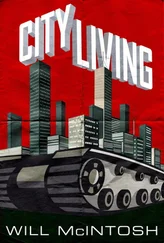The Luyten swung the heater toward the next cars in line, and the next. Paralyzed, her breath caught like a knot in her throat, Lila stared as the vehicles melted.
“ Run ,” Dad howled.
His voice broke the spell. Lila burst from the passenger door and instinctively headed across the highway, in the direction everyone else was running.
“This way,” Dad called.
Lila stopped and changed directions, following Dad toward the nearer trees, moving closer to the Luyten instead of away. Shoulders knotted, she waited for the Luyten to turn the heater on them, but it went on down the row, focusing on the vehicles, but catching most of the fleeing people as well. The people caught in the path of the heater blackened in seconds, their clothes disintegrating without a flame as they dropped to the ground, writhing and twitching, then going still.
Bursting into the tree line, Lila was immediately tangled in thick brush. She dropped to her belly and crawled, squeezing beneath vines and clinging branches.
A few dozen feet to her left, branches snapped and foliage shuddered as a second Luyten pushed toward the highway. Lila froze, head down. It knew she was there—she knew that—but the urge to hide was too powerful to resist. She waited, praying for it not to pause and turn toward her pathetic hiding place.
It crashed out of the trees, toward the cacophony of screams and the stench of burned bodies.
Lila’s father called her name, his tone low and urgent. She answered, crawled toward him until she was in his arms, his whiskers scraping her cheek.
She followed him as he wove through the woods, finally breaking through into the back lawn of a housing complex. The grass was waist-high, the complex deserted. No one had lived there for a year, at least. They were in Luyten-controlled territory.
They sprinted around to the side window of one of the units; Dad pulled a flagstone off the top of a low landscaping wall and used it to smash out the window.
In the distance, Lila still heard screaming.
Her father shimmied inside, then reached out and helped Lila.
“Look for a vehicle password,” Dad said, out of breath. “People always write them down somewhere. Check in drawers, the insides of kitchen and bathroom cabinets, in notebooks.” He headed into the kitchen.
Lila wanted to find a heavy blanket and curl into a ball beneath it, try to replace the images of those people dying with something, anything else. Instead she headed upstairs to search for a code. She dug through the dresser, tossing some woman’s socks and panties on the floor, sweeping her costume jewelry off the bathroom counter.
After ten minutes they gave up and went to try another unit. Across the street, Lila spotted a door standing partially open.
“Dad.” She pointed at the door.
“That makes things easier,” Dad said. They headed across the street.
Lila stood behind him as he pushed the door open.
The living room walls were draped in thick layers of what looked like brightly colored fabric. Heavier semi-stiff fabric bisected the space, cutting it into a number of chambers at forty-five-degree angles. It was strange, beautiful, and absolutely awful, all rolled together. There was no doubt about what it was.
Her father took two stiff steps backward, out of the doorway. He was pale, the corners of his mouth twitching.
“If it was in there, it would have gotten us by now,” Lila whispered, aware of how stupid it was to whisper. If you were close enough to a Luyten that it could hear you, it had known about you for quite some time. Whispering wasn’t going to save you.
They headed toward the far end of the complex to continue their search, as Lila digested what she’d just learned. The starfish were living in houses. If the starfish won, they’d fill neighborhoods and cities, as if they’d built it all themselves and had been there all along.
“I didn’t know they lived in our houses. I thought they lived underground, in those tunnel systems they dig.”
Dad nodded. “I did, too. I’m sure the people in charge know how they live.” He shook his head in sad wonder. “We used to know everything as soon as it happened. Now everything outside our neighborhood is a mystery.”
Lila’s attention was drawn toward a pile of parts squeezed between two of the units. Some were engine parts; the biggest pieces—leaned up against the side of one unit—looked like wings.
Lila stopped short. “Hold on.” She trotted over.
It was a solar ultralight—not much more than an adult toy, but it seated two.
“If we could put this together, we could fly it to Atlanta.”
Silently, her father examined it.
“I can do it,” Lila said. “I can build this.”
July 16, 2029. Washington, D.C.
As the elevator descended, Oliver felt a tingling in his belly, like he’d just hit the apex on a roller coaster and was headed over the drop. It went on and on. It was hard to conceive that he was dropping eight miles below ground. All that stone and earth pressing down on him. Oliver wasn’t particularly claustrophobic, but it was distressing nonetheless.
The elevator opened onto a conference room, with a long, thin black table and a dozen chairs. Framed pictures of President Wood and Premier Abani Chandar, leader of the World Alliance, were the only decorations.
The rest of the facility was set up as an apartment, functional and comfortable, but far from luxurious. It was intended to house a team of strategists who knew things even Wood and Chandar didn’t, who communicated with other teams in similar bunkers through sealed, written documents, their minds out of range of any possible Luyten interception. Now it housed Five, whose cage took up half the living room.
Oliver sat on a couch facing the Luyten’s cage, crossed his foot over his opposite knee. He’d waited five days, hoping that was enough isolation.
“You know what I’m thinking, so you know I intend to keep you down here until you talk to me. If you do talk, there’ll be no reason to keep you down here any longer, and we can move back to the CIA compound.” He looked up at the low ceiling. “Personally, I’d prefer to be there.”
He waited, not exactly sure what it would feel like if Five did speak to him. Kai said it was unpleasant at first.
When nothing came, Oliver went to the kitchen. He paused in the doorway. “Can I get you something? Maybe some tea?” He waited a beat, then smiled. “I’m a tricky one, aren’t I? You’d have to talk if you wanted something. You’re not falling for that, eh?”
He didn’t really feel like tea, but he made some anyway, brought it back to the couch. Sipping a hot beverage made the place, and this company, seem less creepy. Maybe it was the everydayness of it.
He was all alone down here, with a creature who evidently knew his every thought. If anything went wrong, no one would get here in time to help.
What could go wrong?
The mug slipped from his fingers, spilled scalding tea into his lap. Oliver leaped up, jerked open the buttons on his pants, and yanked them down. Gritting his teeth against searing pain he hobbled into the kitchen, turned on the faucet, and splashed cold water across his thighs.
It had spoken to him. There could be no doubt, no mistaking that feeling, which Kai had very accurately described as a scraping.
Oliver found an ice pack in the freezer. After pulling off his shoes and soaked pants, he pressed the ice pack against his right inner thigh, where the skin was the reddest. Then he returned to the living room and sat on the dry side of the couch in his briefs. “Well, that was clumsy of me. Can we pick up where we left off? Nothing could go wrong, absolutely nothing. We’re just having a talk.”
Читать дальше












